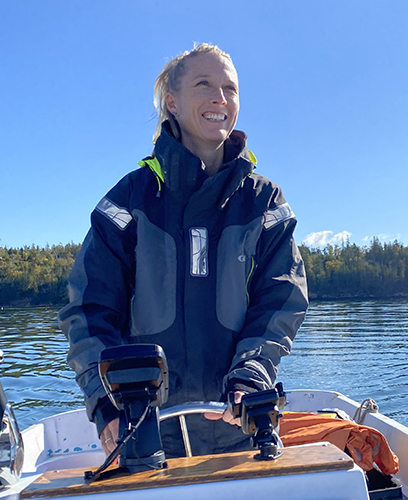Lauren Ross – Mitchell Center Leadership Council

Associate Professor of Civil and Environmental Engineering
Lauren Ross is an associate professor of civil and environmental engineering. She has been a faculty fellow at the Senator George J. Mitchell Center for Sustainability Solutions since 2021.
Her research focuses on coastal physical oceanography—essentially, how different things move through the water in coastal environments. Ross studies how different materials, from harmful algal blooms and salts to microplastics and sediments, are transported via currents and other processes to identify hotspots where potentially harmful materials might accumulate. Her work has already been used to help clammers in Maine rivers and estuaries figure out how to open clamming sites that were closed due to impaired water quality, and aquaculture farmers trying to site new projects. Eventually, she hopes to use her research to help the Department of Marine Resources better monitor for harmful materials.
Her love of coastal environments as a native of Florida and the complex mathematics of coastal dynamics drew her into the field. Ross learned how interdisciplinary coastal sciences are, from the biological sciences of the living creatures there that are impacted by coastal physics, to the social sciences of the people whose livelihoods depend on coastal economies. The tangible impact of her work on communities has sustained her ever since.
After joining the University of Maine in 2016, Ross worked on a project with the Water Resources Research Institute, a program of the Mitchell Center, to study coastal bacterial pollution in the Jordan River estuary in Frenchman Bay. She has also worked on an undergraduate research collaborative to understand the dimensions of tidal energy, resulting in a published paper with several other members of the Mitchell Center. As a member of the Mitchell Center Leadership Council, Ross hopes to continue finding ways to apply science for community change. She also aims to train the next generation of engineers in the state of Maine to approach their work with an interdisciplinary lens that will help them to develop the skills they need to meet the needs of the state.
Ross teaches classes in hydraulics, water wave mechanics and estuary modeling. She received a Fulbright in 2023 for her work on the physics of estuaries in both Maine and Chile and an NSF Career Grant in 2022 to understand how salt influences circulation patterns in estuaries all over the world. Ross also helped found the Watershed Process and Estuary Sustainability Research Group (WPES) at UMaine, and developed a forecast model of tidal currents that is hosted on their webpage.
